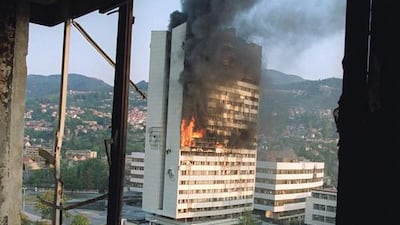The contest for the future of an independent Bosnia unfolded against the backdrop of Yugoslavia’s disintegration in the years following the death of General Tito in 1980 and the collapse of the Soviet Union. Slovenia and Croatia were first to break away in the early 1990s, with the Croatian war leading to a huge refugee crisis.
By 1992, Bosnia with its mix of Serbs, Muslims and Croats sought independence but this was resisted by Serbs elsewhere in the remainder of Yugoslavia who wanted to forge a greater Serbia. The Bosnian War lasted from the spring of 1992 until December 14, 1995. The warring parties were the majority Bosniaks (44 per cent, mainly Bosnian Muslims under Alija Izetbegovic), the Orthodox Serbs (31 per cent, under Radovan Karadzic) and Catholic Croats (17 per cent, effectively under Franjo Tudjman).
At the heart of the war was the five-year siege of Sarajevo, Bosnia’s multicultural capital, by Karadzic’s Army of Republika Srpska, bolstered by forces loyal to the Serbian president Slobodan Milosevic. The army’s commander, General Ratko Mladic, would later be held responsible for the war’s most chilling example of ethnic cleansing: at Srebrenica, where an estimated 8,000 Muslim men and boys were executed as part of a broader effort to expel the Bosniaks from the region.
The war finally ended following the Dayton Peace Agreement, signed in Paris on December 14, 1995, which effectively divided Bosnia into two areas of roughly-equivalent size: one for the Serbs, the other shared by Bosniaks and Croats.
Milosevic and Karadzic were tried by a United Nations war crimes tribunal. Milosevic died before a verdict could be reached, but last year, Karadzic was jailed for 40 years after being found guilty on 10 of 11 counts. A verdict on Mladic is due next year.
Serbia’s union with Montenegro was dissolved in 2006. Both countries are now independent, while in 2008, Kosovo unilaterally declared independence from Serbia. Yugoslavia has now been wiped from the map of Europe.

